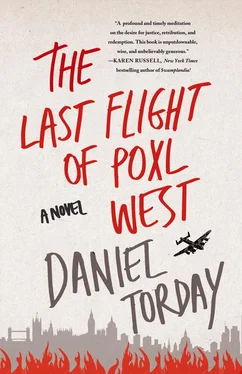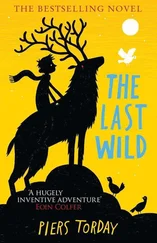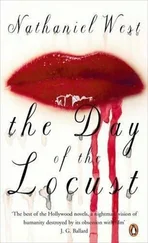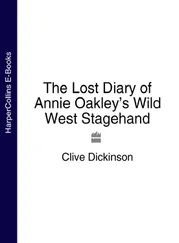9.
One evening a month later, as spring was just fully upon us, my gaze fell to the harbor, whose waters were choppy in the wind blowing out to the great open water along the longest port in Europe. Thirty feet below my perch, Françoise, Greta, and Rosemary were standing next to a small dinghy that bobbed along the choppy surface. I saw Greta stick out one of her legs toward the boat, and nearly fall forward until Françoise grabbed her arm. Rosemary followed. Then Françoise got in.
I called out to her, this woman I’d stayed in Rotterdam to be with at great personal risk. “Françoise! Up here!” But with the sound of the wind she did not hear me. I tried to return to my work. Ten minutes later three men passed in their sailors’ woolens. These men were around my age, perhaps more properly boys than men, as I now understand I was at that moment. They, too, entered a dinghy to return to their boat out in the harbor — the same boat Françoise had just paddled out to. I could swear to this day that one of those boys was the same boy I’d seen talking so gruffly to Françoise just after she and I met. These boys must have been en route between some far shore and the great expansive continent. Perhaps they were Americans, even. Perhaps one of them was the very American who’d given Françoise her mandolin and her records. It was unlikely, I know that now and I’m certain I must have known it then. But it could have been the case. It wasn’t, but I might have believed it. This boy I recognized wasn’t the painter of my mother’s cuckolding, either. But he might as well have been.
I tried to return to my work. A seabird landed on its perch, returning from wherever it is seabirds are always going to and returning from. It looked at me with its black beady eye. Was I my father in his evasive way eluding my mother’s grasp alongside the Labe, a river he veritably owned? Or was I my own man, newly aloft in a new city I’d now lived in long enough to call it home?
I crawled down from my perch. I found an idle dinghy. The oar left knocking against it was rotted. As I traveled into the harbor gloaming, the boat tossed in the waters of the Nieuwe Maas. Mists rose. Drops sprinkled my face, sending my memory back to the days of my youth by the Elbe, when the mist of the river was lifted to our faces in Schalholstice by the big turning wheel of my father’s factory.
I pushed on.
Though for some time I saw nothing but waves, I finally spied the destination Françoise and her friends had reached. For more than a year I’d been unaffected by my knowledge of her profession. Here, faced with the tangibility of this ship, I found a crack I’d known was there splitting into a deep fissure. I found Françoise’s dinghy tied to the ship’s prow. I managed to square mine alongside it. The deck was slick with harbor mist. I stood by the bow. The only sound was the harsh break of waves lapping at the ship’s starboard side. Twenty-five feet ahead of me a portal glowed against the evening’s half-light. Looking down through the window, I saw three women pleasuring three young sailors. Strewn over the arms of a pea green ship bed and two desk chairs were wool sweaters with roll necks bunched up like chastised house pets. On the floor, a white cotton undershirt like spilled milk.
Françoise was the most active of the three women. She was sitting up atop the insubstantial, hairless body of that same young deckhand I’d observed paddling out to the ship, moving all about with an energy I’d never seen her take on with me. She had on no shirt. She was utterly undressed, naked in a way different from that she’d ever been with me. I saw a guitar leaning up against the wall in the corner of the berth. I allowed myself to be sure now I’d seen this boy speaking to Françoise that first night I met up with her. As I knelt on the deck of that ship watching Françoise on top of this boy, the guitar in the corner, I tried to convince myself it was nothing. Was it nothing? Then Bohemia and all that’s in it is nothing. Seasickness gripped my stomach. Though it went against the most difficult decision I’d made in those months, I resolved at that moment no longer to leave myself subject to the feeling I had then, the same embarrassment my father had so clearly left himself subject to. The facts began to matter less and less. It was what I was feeling that mattered, and I had only one instinct — to flee.
I turned from the window. Just as had been the case that last day I was in Leitmeritz, there was no decision left to be made. It had been made for me, before my eyes. My body did have muscle memory after all, and it wasn’t the memory of making chords. It was the memory of leaving Leitmeritz that afternoon I saw my mother with her painter. One foot before the other, all the way to the train station. My body knew just how to leave.
That night I packed. Next morning I left my flat for the British consulate to get the visa my father had arranged. With U-boat attacks on ships in the Atlantic and the North Sea all winter long, travel was dangerous, but my body was determined to reach London. In a room at the back of the consulate I was provided a secondhand longshoreman’s sweater and a ticket for passage to Britain. I would enter the country at the port of Grimsby, from which I could travel by land to London.
On my way to the harbor I stopped to see if Françoise was at her position at the café. I was about to risk death to put the North Sea between us, but my mind was like melody and harmony in counterpoint — there was a second kind of memory in my muscles and it longed to see Françoise once more.
But she was not there.
When I think of it now, do I recognize what I was doing, the mistake I was making by leaving Françoise without saying good-bye? If you have had such wisdom in the moments when you were driven by emotion, by jealousy and confusion — well, nostrovia, as the Russians say. Had I taken a day more to think about it, had I taken Françoise back on a bicycle to the tulips fields, where we could have talked about it, could she have alleviated the anger I was feeling? Would it have changed what I was feeling? I’ll never know. What’s done cannot be undone.
My decision was made. My body was in motion. I would not vacillate further. So I traveled along the same path as during the previous day’s trek, and only an hour later a large ship run by William Muller and Company had a space for me, and I boarded.
We embarked.
10.
The open sea was cold. I spent the long passage out the Nieuwe Maas up on deck, looking north and gazing at the waters trying to imagine I could see the U-boats circling us, seeking our demise. While up there I experienced a feeling of the loss of love I’d only experienced something close to one time before. When I was twelve, most of my summer was spent by the oxbow in the river below my father’s factory. Evening would arrive as we relaxed upstream from those waters, which served as the waste bin for whatever refuse was sloughed off by the workmen at Brüder Weisberg. Each afternoon before dark the children of Leitmeritz would walk down to the Elbe to the same bend in the river where my cousins and I had spied my mother and father in their broken flirtation when we were too young to know what we’d seen. There we swam. Fifty feet out into the middle of this stretch of water our father’s fathers had built a birch-wood dock. Across from this dock dangled a rickety ladder.
One day I walked amid the din of afternoon cicadas crying in treetops. We children of the little city of Leitmeritz worshiped at the brown river’s ankles. My cousins lived between my family’s house and the river, and I picked them up for the walk. I could think that day only of a little girl named Suse. My pursuit of her had become an idée fixe. She was in Niny’s class at the gymnasium, the daughter of one of my father’s workmen. I’d known her father, Vladek, since I was a child. He was a dedicated worker who did not speak much. His disdain for his station and for my father was never obvious, but I’d always surmised it must be present.
Читать дальше












